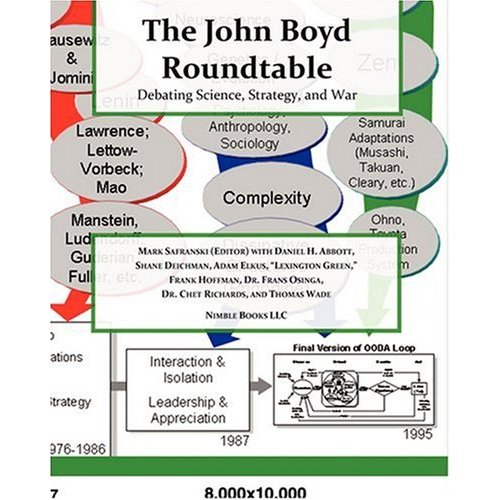Getting it: Pundita on John Boyd
Wednesday, September 24th, 2008I’d like to thank Pundita for her marvelous review. Not because it was laudatory, though that aspect is much appreciated but because she was not, prior to reading The John Boyd Roundtable , particularly familiar with the theories of Colonel John Boyd beyond a few passing references. She instantly “got it” and drew a wonderful analogy in her piece with one of Boyd’s contemporaries who also thought deeply about conflict. This is exactly what we had hoped the book would do – be a gateway to insight:
Colonel John Boyd and the revolution within
The book is the perfect gift for friends and relatives who complain that you spend too much time on the blogosphere. The Roundtable book arose from a cooperative effort by bloggers from a variety of disciplines and who analyze what is arguably the best book ever written on Boyd’s ideas — Colonel Frans Osinga’s Science, Strategy and War: The Strategic Theory of John Boyd.Because this era is one of unrestricted warfare you can’t really understand the times unless you understand something of Boyd’s thinking and contributions to military strategy. So the book reflects the blogosphere at its most useful because Boyd’s ideas can be difficult to approach, even for those versed in military history.
…Boyd’s Thunder and Lightning shop profoundly influenced the U.S. military’s approach to warfare. He died at the age of 70, a year before al Qaeda’s one-two punch in 1998 against U.S. embassies officially launched the era of unrestricted warfare.The U.S. government’s lumbering and wholly ineffective response to the attacks underscored that the “business as usual” mindset in Washington had confined Boyd’s ideas to narrow parameters. It took almost four years of the U.S. military stumbling around in Iraq before men steeped in Boyd’s ideas were finally let loose on the situation.
I venture that John Boyd was the closest the modern U.S. military ever came to Bruce Lee’s view. But as with Lee it was easier to understand Boyd in person — in Boyd’s case, in marathon lecture sessions and the give-and-take of dialogue and debate.
…The ideas couldn’t be approached from the comfortable armchair of the intellect; they had to be wrestled with in the alchemy of personal transformation, through pushing the boundaries of one’s experience, instincts, and knowledge.This process helped develop some great military thinkers but also limited the applicability of Boyd’s ideas. If there’s one thing that the top military command and its funders don’t like to hear it’s the words, “It depends.”
Read the review in full here.

 few were initially skeptical and we had one certified critic ( though I had tried to recruit several more). Overall, it was the kind of exchange that makes the blogosphere special as a medium when it is at it’s intellectual best.
few were initially skeptical and we had one certified critic ( though I had tried to recruit several more). Overall, it was the kind of exchange that makes the blogosphere special as a medium when it is at it’s intellectual best. We had an excellent roster of contributors for
We had an excellent roster of contributors for 

